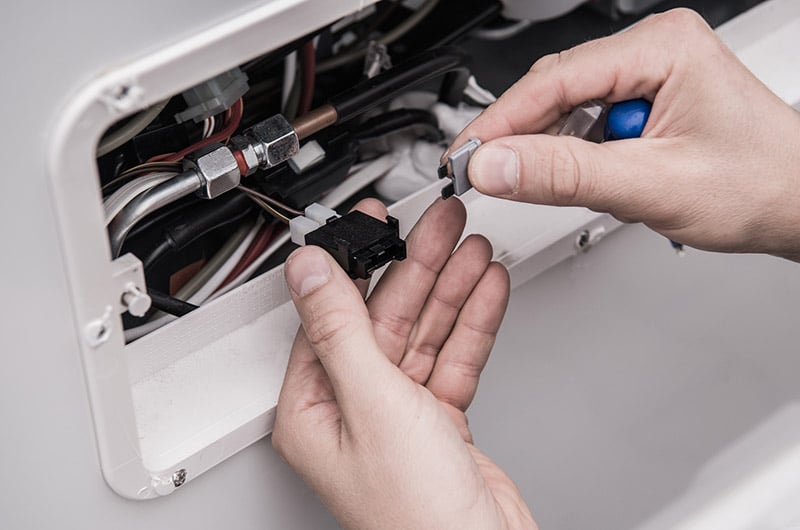If you’re used to doing work on your vehicle, then you may get yourself a RV and think everything is going to be the same.
For instance, if you need to replace fuses on your RV, then you may assume that they are the same as a car fuse.
But are they? No, RV fuses are not the same as car fuses.
This is primarily due to the fact that these two types of vehicles have different electrical systems and electrical needs.
Below we’ll go into more detail on this topic for RV owners who want to know about RV fuses before hitting the road.
Difference Between RV Fuses and Car Fuses
Both car fuses and RV fuses have the same basic function of protecting the vehicle’s electrical system from damage, but that’s where the similarities end.
An RV has lots of electrical components that a car does not have, such as a refrigerator.
And that means that a RV has more fuses than a car does.
RVs Have A Fuse Box, Car’s Don’t
Another big difference when we’re looking at RV fuses vs car fuses, is that cars don’t have a fuse box (or breaker box) and circuit breakers, while RVs do.
If you think about it, a RV is just a non-stationary house, which is why it has a fuse box and circuit breakers when a car doesn’t have both of these electrical components.

Instead, cars have a battery under the hood, which is what ends up going bad and needing replaced.
And the car’s fuse box is also under the hood on the driver’s side of the vehicle.
Explaining RV Electrical Systems and Power Sources
RVs can be a bit confusing for new owners because they typically have three different power sources.
- AC electrical system
- DC electrical system
- Propane system
The propane is typically for running large appliances and if the RV has a gas stove, then it will power that as well.
The DC system is powered by 12V batteries. This system powers small things like light switches in the RV.
The 120V AC system is often powered by generators, unless you’re at a campground where you can hookup to the campsite’s electrical system.
The AC electrical system in a RV power things like your air conditioner and small appliances, like the microwave.
So, you’ve got three power systems for the RV, so where the heck is the fuse box located?
Where Is The Fuse Box In An RV?
One important thing to note is that the exact location of an RV’s fuse box may vary from one RV model to the next.
So, if you’ve upgraded to a new model, that fuse box might not be in the same location as it was in your old RV.
Most of the time, you can find the RV fuse box tucked away in a “hidden” location.
Places to look for it:
- Inside a cabinet
- Under a bed or table
- On the wall under the refrigerator
By the 110V circuit breakers is where you will find the 12V fuses in your RV.
Types of RV Fuses
Now that you know where to find the fuse box in your RV, you should familiarize yourself with the various types of fuses your RV uses.
The types of RV fuses are:
- glass cartridge
- blade
- slow blow
- circuit breaker
The glass cartridge fuses are what you’ll find for things like your RV’s backup monitors and mirror remotes.
These are the smallest type of RV fuses.
Blade fuses are what you’ll find powering things like the light switches. They are used for things being powered by the 12V circuit.
Slow blow fuses are what you’ll find powering anything with its own motor, like the air conditioner.
And circuit breakers are what you’ll find powering anything on the 120V system, like the refrigerator.
Types of Car Fuses
Compared to RVs, cars tend to primarily use one type of use – blade fuses.
For things like your car’s battery, what is used is a bolt-down fuse.
And some automakers are using FMM fuses in certain models. This is a type of maxi cartridge-type fuse.
What Size Fuse Do I Need For RVs?
As you already know, fuses come in a variety of sizes.
And as an RV owner, you’re going to need several different sizes fuses.
Sample RV fuse sizes:
- 1 amp (for remote mirrors)
- 15 amps (for water pump and 12V outlets)
- 30 amps (for hot water heater)
What this means that you should really keep a couple of RV fuse kits inside the RV so that you’re prepared to replace any size that goes out.
We recommend these affordable kits:
It’s a good idea to to have both a blade fuse kit and a glass fuse kit to be best prepared.

What Size Fuse Do I Need For Cars?
Are you wondering how RV fuse size compares to the fuse size that cars use?
You’ll notice that there is some similarity between the two.
Sample car fuse sizes:
- 5 amps (for trailer brake switch)
- 7.5 amps (for wireless charger)
- 10 amps (for power windows)
- 30 amps (for the power control module on the driver’s door)
As you can see, the fuse sizes aren’t all that different between the car and the RV needs.
Final Word
Understanding the fuse needs of an RV and how they differ from your car is essential both for staying safe on your trip, as well as being prepared for any on the road maintenance needs.
Don’t rely only on your knowledge of car fuses as RVs have some distinct differences that RV owners should be aware of before driving off on a trip.
And it’s best to be prepared with the RV fuse kits that we recommend above.
